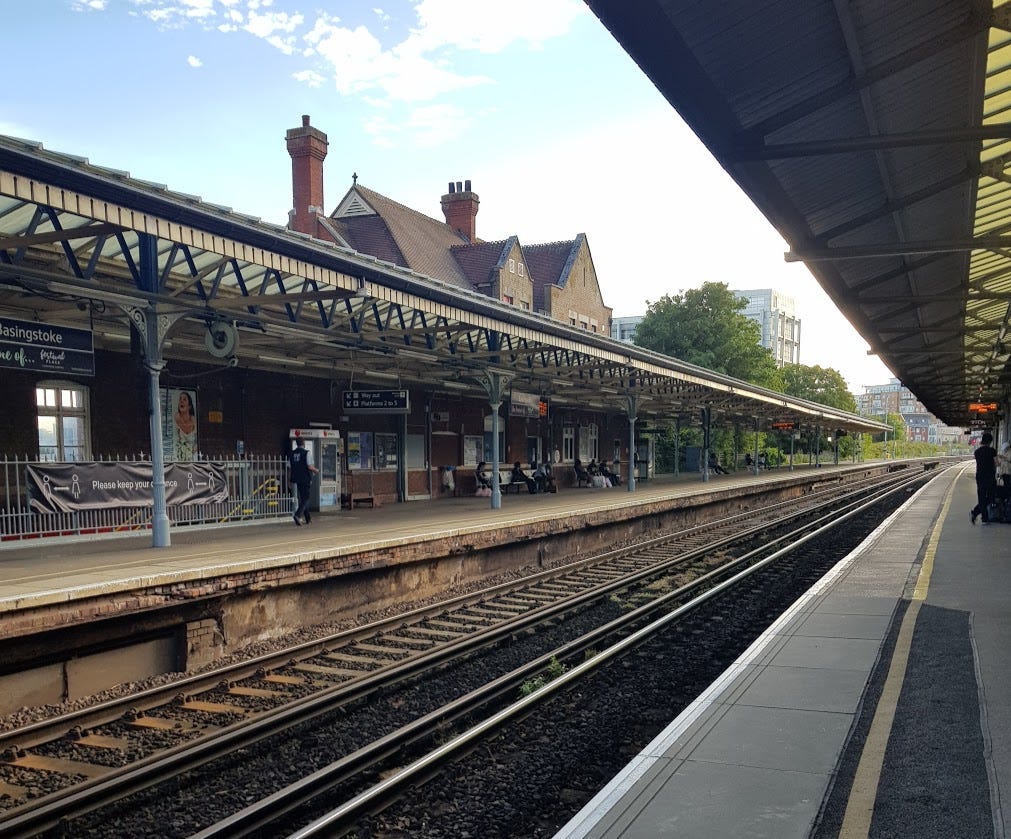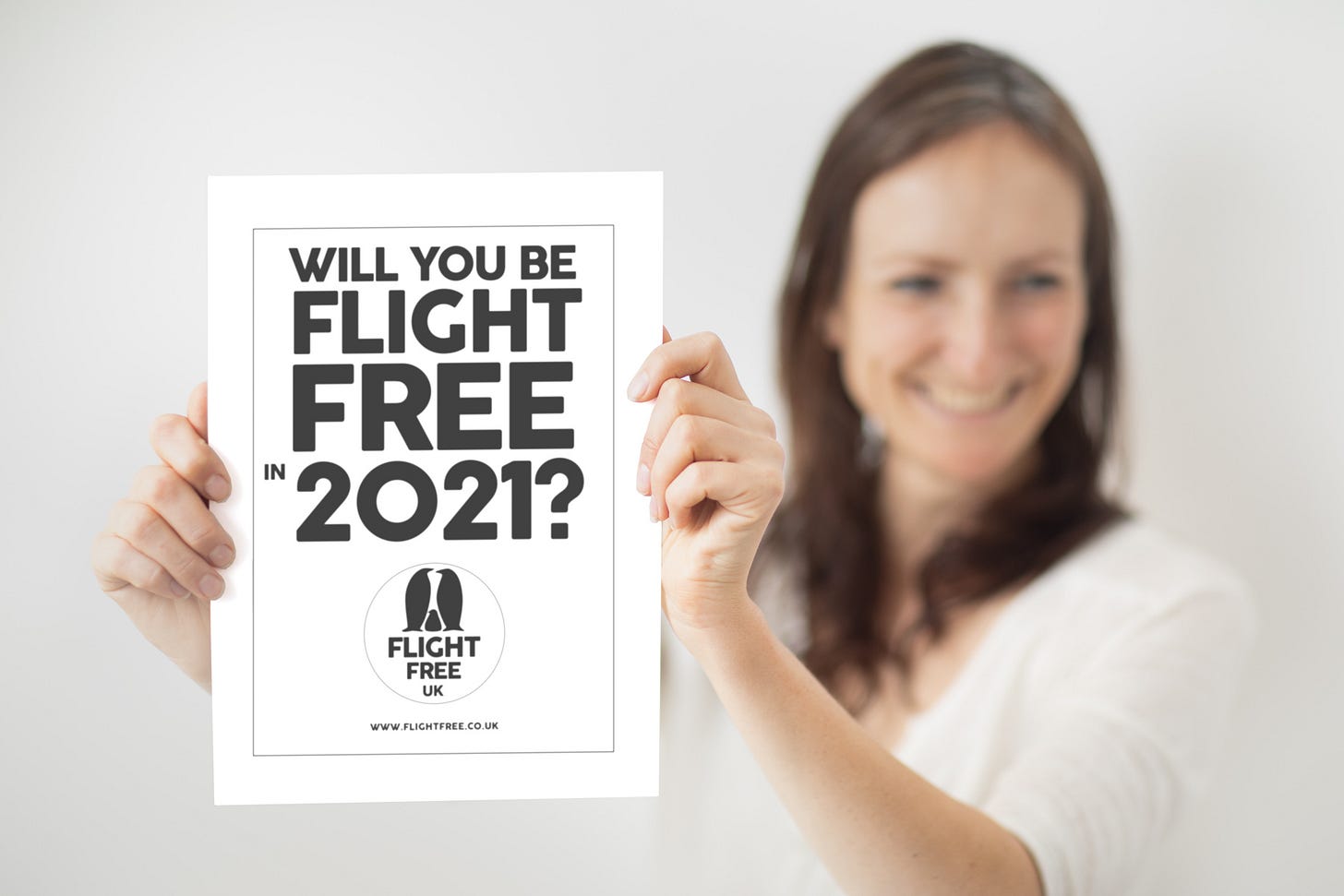How to travel without completely trashing the planet
The Green Fix on rethinking that post-Covid weekend flight to Spain.
Trains have always been a refuge to me.
They’re a liminal space - a transition space between two situations. Like a waiting room or a car park. Have you ever paused steps from your exam building or moments before entering a room for a difficult conversation, and wished you could just stay there, in the ‘just before’ state, for a while longer?
These in-between spaces are a temporary flight from everyday life. Just before everything sets in motion again.
And in a fast world that’s speeding up all the time, we are squeezing out those spaces for a pause.
I was bored on the train to Belgium. But I craved that boredom. Any of you who read the last Green Fix know that the last month or so has been anything but boring. (And by the way, thank you so much to everyone who reached out afterwards - the response was staggering).
I think that boredom was just the uncomfortable reflex that I had to fill empty time with something ‘productive.’ That I have to do everything as fast and efficiently as possible.
This edition is about sustainable travel. Cheap fast flights across Europe for a weekend away, ready-made plastic-wrapped sandwiches and 52 fashion ‘micro-seasons’ a year: the fast options are often the most devastating for the planet. A convenient option now creates a much greater inconvenience down the line.
Like many other aspects of sustainable life, so much of the change that is needed is to slow down.
So take the train. Be bored. We don’t need to hurtle blindly at breakneck speed to an uncertain future. Let’s slow down and give ourselves the time to figure out a way of living that works.
***
NEW PROJECT! Some of you may have already seen this survey floating around for a mysterious new project I’m planning (it’s not mysterious, I’ll tell anyone who asks).
Curious? Please fill it out and you’ll have the option to get updates on the project, plus the possibility to get involved.
***
Please help share the Green Fix! I run The Green Fix for free, in my own time, alongside full-time freelance work *world’s tiniest violin starts playing*. Your support sharing it means a lot. So if you like this newsletter, please tell other people, using the button below:
What’s Going On?
Dutch court orders fossil fuel company Shell to cut CO2 emissions by 45% in the next decade.
Useful: What is Shell’s impact on the climate?Shareholders rebel against fossil fuel companies Exxon and Chevron over lack of sufficient plans to reduce emissions.
Related: Why climate action won against three fossil fuel companies in one day.Australian courts recognise that government has duty to protect young people from the impact of climate change.
Related: How taking climate cases to court became a new trend worldwide.Animals are formally recognised as sentient beings in UK law.
Useful: What does animal welfare have to do with climate change?A new report finds that just 20 companies are responsible for over half of single-use plastic waste.
Useful: Four ways to fight plastic pollution.The International Energy Agency says that net zero by 2050 requires an immediate end to all fossil fuel investments.
Useful: Carbon Brief’s breakdown of IEA’s roadmap to net-zero.
Focus On… The Flight Free Campaign
Anna Hughes, Director of Flight Free UK, on why we need to find alternatives to flying.
What is the Flight Free campaign?
The Flight Free campaign asks people to take a year off flying to reduce emissions and inspire a social shift away from aviation.
We tend to fly because we see those around us flying, and assume that it's the expected and normal way to travel. Challenging yourself to a year off flying forces you to explore those alternative ways of travelling as well as spend more time closer to home. It's a great way to encourage longer term behaviour change: many of the people who take our pledge stay flight free year after year.
Why is flying an environmental issue?
Flying is the most carbon-intensive way to travel. Nothing we do raises our carbon footprint so quickly and by so much than taking a flight. Just one flight can put your carbon footprint above sustainable levels.
At this crunch point for the climate, we need to drastically reduce our carbon emissions, and if we continue to fly, that simply won't happen.
[Relevant: What is the personal carbon footprint?]
A recent study says that over half of aviation emissions are from 1% of people. How do we tackle this group of super-emitters?
Flying is a justice issue, not just an environmental issue. It's the high-carbon lifestyles of us here in the West who create the majority of greenhouse gas emissions, yet it's the people in other parts of the world who have done least to cause the climate crisis who are suffering from its effects right now.
Social injustices such as this have always existed: it's the richest among us who pollute the most, and we here in the West are rich and privileged.
Tackling the super emitters requires a mix of legislation, regulation and taxation. People fly a lot because it is so cheap. If an airline ticket were to more accurately reflect the environmental cost of the flight, that would do a lot to reduce demand. We should tax aviation fuel. There should also be less easy access to so many flight routes.
In France, legislation has just been passed that domestic flights should be banned if the journey can be made in under 2.5 hours by train. Removing the option of that high-carbon route helps change people's behaviours.
'I have to fly because I can't afford other ways to visit family/for work/it's the only realistic option for me.' How can I reduce the impact of my flight?
The uncomfortable truth is that the only way to reliably reduce the impact of your flight is not to fly at all.
Of course, quitting all flights is not practical for some people, but things like carbon offsetting are not a solution. Offsetting makes us think our emissions don't count, and gives us licence to continue our polluting behaviour.
Asking your employer to fund climate-friendly travel might have a better outcome than you expect, if you just ask. If your family lives in Europe, taking the train can be a much more enjoyable, less stressful way of visiting, and can enhance your journey.
Will Covid-19 change the way people travel forever? Should it?
Covid-19 will probably have the most profound effect on business travel. Online meetings, conferences and training sessions are cheaper for a company as well as helping to reduce their environmental impact.
The biggest bounce back will probably be in visits to families and friends. Holidays can be taken closer to home, but since Covid-19 hit we have become more aware of how much we value our family and friends, and we'll be desperate to reconnect after so long apart.
Air travel has enabled us to maintain relationships with families and friends split across the globe, and that is only set to increase.
That is going to make things very difficult to reach our climate targets. It's a difficult decision to choose not to fly when that means missing out on visits to family and friends, but that is the stark situation that we are facing. A safe future for our children has to come first.
You can find out more about the Flight Free UK campaign on their website, or check out the global Flight Free campaign here.
So Now What Do I Do?
LEARN MORE
Read: Is it possible to fly sustainably?
Read: What is carbon offsetting and does it help the planet?
Join University of Plymouth’s online conference on ‘the race to net zero emissions’ on 24th-25th June.
TRY SOMETHING NEW
Try slow travel and find an alternative way of exploring the world.
Register for the Stay Grounded campaign newsletter for monthly updates of actions you can take to create a safe and just world.
Share your dream for the earth in this new campaign by The Hack for Earth Foundation in collaboration with the UN.
CHANGE THE SYSTEM
Sign 350.org’s petition to get Bundesbank to stop investing in fossil fuels!
Got a great idea for a solution to environmental issues? Submit your idea to the Global Innovation Challenge 2021 to bring it to life!
Tomorrow (3 June): sign up to this EU talk on how young people can help build a circular economy.
If you have a topic you want the Green Fix to cover, fill out this feedback form & tell us your idea!
Stay in the loop
I share updates on the Green Fix, polls and additional resources on Instagram @coffee_and_casstaways. You can also say hi on Twitter.
Know someone interested in environmental issues? Forward this email to them - we want to reach people who care about doing more for the planet, with your help!






